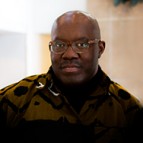 As he read the media reports on the recent Ebola outbreak in Africa, Carleton African Studies Professor Nduka Otiono was frustrated by the misleading impressions in them.
As he read the media reports on the recent Ebola outbreak in Africa, Carleton African Studies Professor Nduka Otiono was frustrated by the misleading impressions in them.
“It sounded like the whole continent was being ravaged by Ebola. They were describing Africa as a homogenous country, not a continent,” said Otiono, who had been a journalist and writer in his home country of Nigeria.
He says it’s a common misconception among Westerners, and one that can prevent them from having a realistic experience when they visit the African continent.
That prompted him to create a course for foreigners who are seeking a genuine experience of Africa, not just safaris and “exotica”. Entitled “Doing Fieldwork in Africa”, it will run June 6 and 7 as part of the FPA Professional Institute series.
“We have very distinguished researchers with extensive experience working on the continent who will employ interactive workshop strategies to connect the two worlds,” said Otiono. “The workshops to be led by the eminent scholars Tim Shaw and Jane Parpart, is intended for academics, public officials, students, media practitioners, tourists, and policymakers who want to understand the continent beyond the armchair reporting that we’re accustomed to.”
Security concerns and social problems are among the serious issues that individuals and organizations with inadequate knowledge of the African terrain dread. Otiono says the course will arm them with critical survival tools that will put them in a better position to make informed decisions on field trips to the diverse continent.
Otiono adds that Western visitors often make simple mistakes that can create barriers to developing relationships with Africans. For instance, elderly people may never be addressed by their first name, some situations call for modesty, and even the weather can pose a challenge.
“I remember my first visit to Morocco, when I underestimated how cold it could be on my tropical skin,” laughed Otiono.
Most importantly, Otiono says the workshop will allow travelers to have a more meaningful experience in Africa. “Whatever the participants’ professional leaning or purpose of visiting any part of Africa, this summer institute will educate them on the ‘big ideas’ around security, ethics, and gender, and arm them with appropriate skills/practicalities for successful field trips and social interaction in the continent,” Otiono concluded.